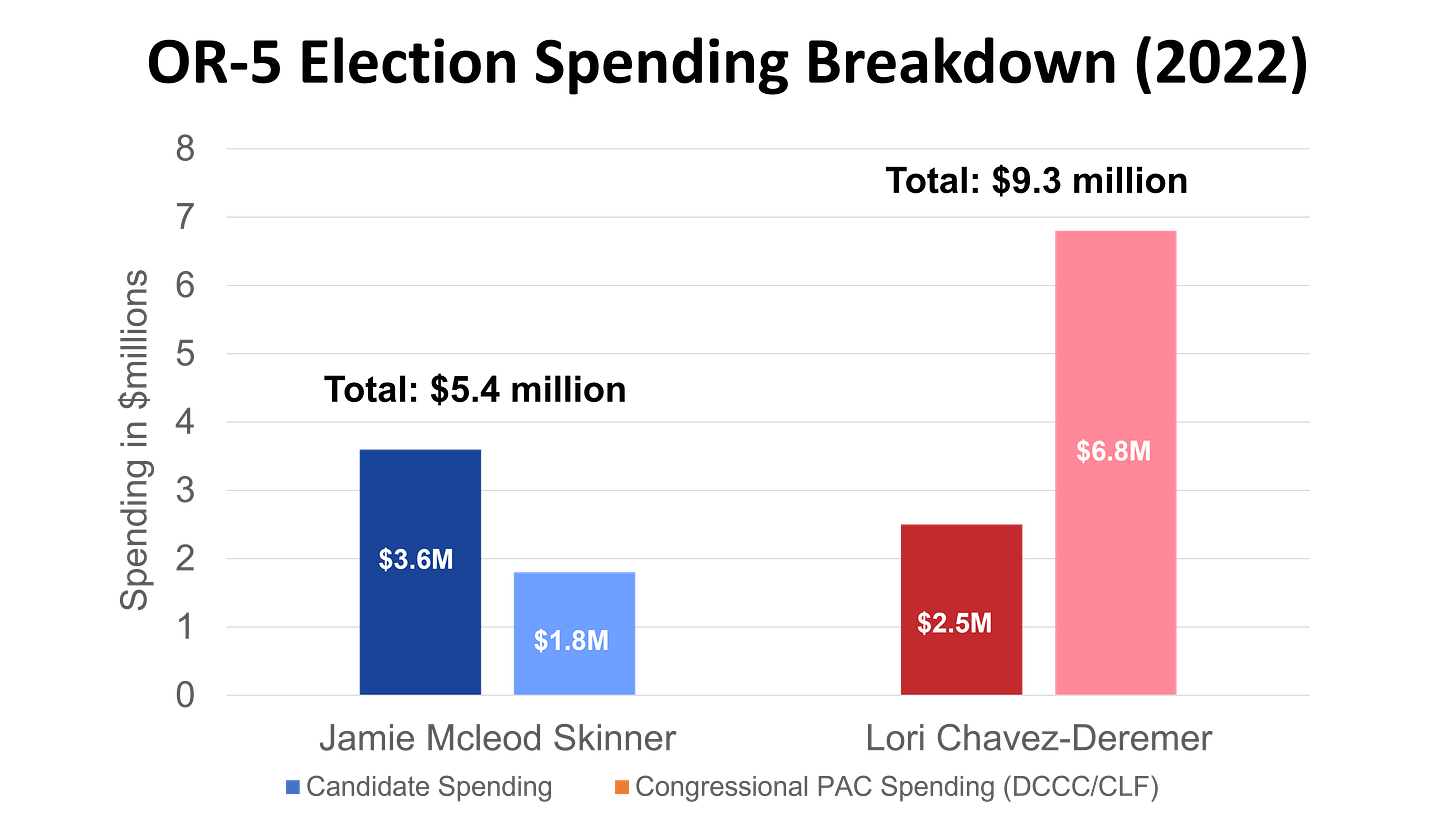
Topline Takeaways
Republicans picked up a new seat in Oregon, largely due to national Democrats’ failure to spend heavily on OR-5.
With her close win, Tina Kotek will become one of the nation’s first ever lesbian women to to serve as governor. (This distinction is shared with Maura Healey, a lesbian candidate who also won her 2022 gubernatorial race in Massachusetts.)
While some pundits were quick to cast newly elected Democratic Gov. Tina Kotek as a weak candidate due to her inability to win 50% of the vote in deep-blue Oregon, this characterization is fairly inaccurate when you look at Oregon’s recent governor’s race more closely.
Oregon’s gubernatorial map was scrambled by independent candidate Betsy Johnson. Johnson has spent 20 years serving in the Oregon Legislative Assembly, serving terms in both the State House and the State Senate. She’s best identified as a center-left candidate: she supports protecting abortion rights and also voted against the state’s recent push to raise the minimum wage. As a result, she was able to garner respectable support across the state, ultimately pulling in 8.5% of the total vote.
Johnson’s presence in the race complicates the political narrative, primarily because she saw most of her support concentrated in the northwestern corner of the state. This part of Oregon has a long history of political diversity: no county in this region has supported either major political party by a vote of 60% or more in any statewide election over the past 20 years. Johnson’s candidacy sheds light on this trend in both Northwestern Oregon as well as portions of the Willamette Valley. While Johnson didn’t produce any county-level wins, she did prove that there’s a vocal coalition of Oregon voters that are searching for center-left options rather than progressive left or far-right candidates.
OR-5: Lori Chavez-DeRemer v. Jamie Mcleod-Skinner
Oregon gained a new congressional district following the 2020 census, upping the state’s representation in the US House to six members. Many expected Democrats to pickup this new seat as their party was in control of Oregon’s redistricting process. Once Democratic incumbent Kurt Schrader lost his primary in OR-5, all hell broke loose.
Oregon’s fifth district was immediately thrust into the national spotlight as a seat that could potentially determine control of the entire US House. Republicans immediately turned on the advertising fire-hose and absolutely soaked the race in campaign funds. Democrats on the other hand? They very clearly left their candidate out in the cold.

Democrat Jamie McLeod-Skinner was ultimately outspent by a 2-to-1 margin largely thanks to the disparities in support from congressional PACs. Despite such a wide gap in campaign spending, Mcleod-Skinner came incredibly close to winning, losing by less than 7,500 votes, and proved that she could have been successful had she been given more institutional party support. Local Democrats that supported Mcleod-Skinner are fuming at the national party for the lack of support their candidate received in such a nationalized House race.
”While they pumped last-minute money into the DCCC chair’s losing race in New York… Jamie has been holding on entirely based on her strength as a candidate and her grassroots support.” -Dani Negrete, national political director of Indivisible
This is not the first time the national Democratic party has snubbed a successful primary challenger, forcing them to fumble in the general election. Back in 2018, national Democrats were upset when Brad Ashford lost to political newcomer Kara Eastman in Nebraska’s 2nd congressional district primary. Much like Mcleod-Skinner, Eastman was largely ignored by the national party during the general election despite only losing by 5,000 votes. (This Nebraska story has actually evolved into such a karma-fueled gut-punch for Democrats. National Dems have turned themselves around and now view NE-2 as a prime pick-up opportunity… just as their beloved Ashford endorsed the Republican incumbent they’ve desperately tried to unseat: Rep. Don Bacon. Meanwhile, Eastman’s 2018 campaign is still the best Democratic performance to date in the district.)
“This seat could have made the majority, but the national Democratic PACs walked away and left Jamie to twist in the wind…”
-Rob Duffey, spokesperson for the Working Families Party




